July 30th, 2020 – It has been nearly two years since most parts of the Oromia region have been placed under command post rule, which is equivalent to martial rule. The infamous command post rule was declared in December 2018 in Western and Southern Oromia region without approval by parliament. It was established under the pretext of law enforcement operations. In addition, a country wide State of emergency was declared on 08 April 2020 to help curb the spread of the coronavirus pandemic. On top of that, the anticipated election scheduled for August 2020 has been postponed with no justification other than COVID-19. The August election had been seen as a key test of a “reformist” agenda of Prime Minister Abiy Ahmed. Extending tenure of power without election is unconstitutional.
On the other hand, Ethiopia has had well-documented horrendous human rights infringements inflicted up on citizens under previous states of emergency imposed during several years of anti-government protests, and the current state of emergency and command post rule further exacerbated the situation. In particular, people under command post rule are direct victims of extrajudicial executions, arbitrary detention and arrest, rape and beatings causing serious injuries. Recent findings from Amnesty International allude not only to a truly horrific violation of human rights but also an attempt by the government to prevent the information from coming to light.
More recently, the government security forces have been burning citizens’ houses to the ground in rural areas as a counterinsurgency tactic. Victims are those who have been suspected of supporting, sharing information with and feeding the armed groups – Oromo Liberation Army (OLA) that splintered from the Oromo Liberation Front’s (OLF) military wing.
This report is devoted to highlight the underreported attack of security forces against citizens in forms burning down houses to ash under the cover of law enforcement. Information about the incidents covered in this report was gathered from different credible sources including social media and broadcasting media outlets.
Burning citizens house to the ground as ‘counterinsurgency’ tactic
Torching homes have become common occurrence in what appears to be preferred counterinsurgency tactic by government security forces in different corners of Oromia region. The measure has been considered as a counterinsurgency tactic by the Ethiopian governments even before the political reform under Prime Minister Abiy Ahmed started. The tactic was as old as the previous EPRDF government itself. The intention was to terrify and weaken the local potential allies of armed groups, because armed groups usually live in the locality. The tactic was used in the 1990s to attack OLF in Bale, Borana and Guji zones of Oromia region. Assuming the attack as effective practice in weakening the rebel groups in Oromia, it was also exported to Somali region under the leadership of Abdi Illey.
However, burning citizens’ houses for political ends is immoral as per norms and values of Oromo people, and ultimately illegal action under international and municipal laws. For instance, it is stated under article 6(b) of the 1945 International Military Tribunal Charter (Nuremberg) Charter: “wanton destruction of cities, towns or villages, or devastation not justified by military necessity” as a war crime. In addition, Article 50 of the 1949 Geneva Convention I,
Article 51 of the 1949 Geneva Convention II and Article 147 of the 1949 Geneva Convention IV underscored that “destruction and appropriation of property, not justified by military necessity and carried out unlawfully and wantonly” are grave breaches. Article II (1)(b) of the 1945 Allied Control Council Law No. 10:“wanton destruction of cities, towns or villages, or devastation not justified by military necessity” is a war crime. Article 2(d) of the 1993 ICTY Statute gives the Tribunal jurisdiction over grave breaches of the 1949 Geneva Conventions, including “extensive destruction and appropriation of property, not justified by military necessity and carried out unlawfully and wantonly”.
It is against this backdrop that Ethiopian security forces have been burning citizens’ houses in different parts of Oromia region.
Case-1: Families house burned down, because their son joined rebel group in West Wollega
This time around, being a family member of a rebel group by itself has been considered a crime in Oromia. Families are paying huge sacrifices just because one of the family member who, legally speaking, reached above legal age opposed the government or joined Oromo Liberation Army (OLA), a rebel group operating in different corners of Oromia region.
On 22 June 2020, security forces burned down Mr. Yonas Hirpasa’s house in West Wollega zone, Gulisso district, Sanki Danno kebele, because his son joined the OLA. Mr. Yonas is a farmer, and his house was burnt to ash with all valuable properties.
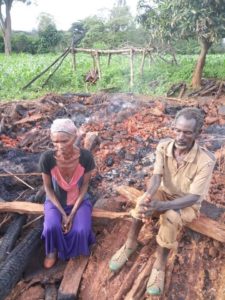
Since the attack happened with no prior notice, all of their properties such as stored cereals, furniture, stored coffee, and domestic animals such as chicken and sheep were all burnt along with the house. Localities stated that Mr. Yonas is one of the economically impoverished rural poor residents who has been striving hard to feed his families with volatile livelihood. Worst of all, he became homeless along with his families due to the horrific measure taken by the security forces.
Earlier in June, 2020, a recorded video showing Oromia special police force setting fire to house built from grass in Guji zone has been circulating on social media. Prior to the disclosure of the video, Amnesty International’s recent report reveled government security forces were burning down farmer’s home in both East and West Guji zones. Even though, the government vehemently denied the contents of Amnesty’s report, residents have been publishing hard evidences that corroborate Amnesty’s report. One of such report is showing the special police force burning a farmer’s house and dancing around it has just surfaced. Their voices heard saying even the farm equipment should kept in the house and burn. What is alarming is the soldiers feel so proud posing for picture and dancing which is very hard to watch.
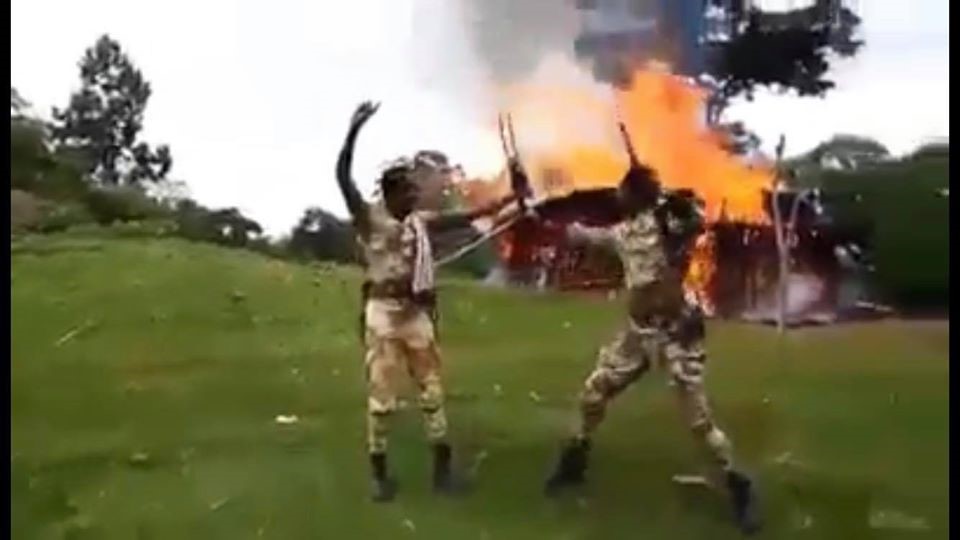
Picture taken from a video showing how oromia police set alight to house and pose for picture
Case-2: Dozen of Houses Burned to down in North Shewa Zone, Oromia Region
Burning the house of people suspected of supporting and exchanging information with rebel groups took place in areas where even the active operation of OLF has not been reported. For example more than 10 houses of farmers were burned to the ground in different kebeles of Dagan district, North Shewa zone within a week.
On 16 June 2020, the security forces burned down Mr. Zerihun’s house in North Shewa, Dagam district, Sheno kebele. Mr. Zerihun Amberbir is a farmer, and was suspected of supporting OLA by the government. Zerihun’s mother testified about the incident as follows:
“The Oromia special police forces burned down my son’s house after bitterly beating his wife and kids. I knelt down, and begged them to stop burning the house, but they gave me a deaf ear. We were denied to collect valuables. We watched the house burning to the ground”
In the same district, Ano kebele, security forces burned down the house of Mr. Fekadu Gonfa on 15 June 2020 for the same reason. It was reported that three houses of Mr. Fekadu were burnt to the ground along with valuables including house furniture, clothes, and stored cereals estimated to 150,000 ETB. The same measure was taken against Mr. Mulugeta Abebe, Mr. Abebe Jima and Mr. Eshete Adugna’s houses in the same area. The estimated costs of damaged properties are around 500,000 ETB.
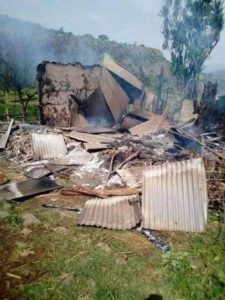
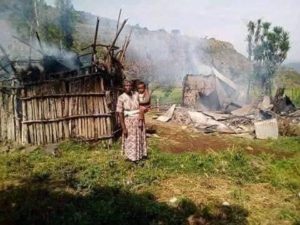
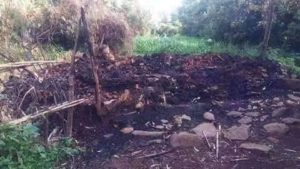
Few pictures of burned houses in Dagam district, North Shewa zone
In Ali Doro kebele, Mr. Siyoume Adino’s house was burned by government security forces on 21 June 2020, because his son allegedly joined rebel forces. Mr. Siyoume is a farmer and 70 years old elder. The security forces including the Oromia special police force and local militias operating in the area in collaboration with ruling party’s cadres gave Mr. Seyoum an ultimatum to bring his son home and when he failed to do so, he ran away. They jailed his wife months ago, and burned his house.
The son of Mr. Seyoume, Geda Siyoume said that 30 Oromia Special Forces visited them on Sunday, 21 June 2020 at 6:00AM. He added, “they asked the whereabouts of my brother, whom we have never seen for seven years. We saw my brother for the last time when he was a third year student at Wollega University back in 2005. Since then, we have never seen him.” They told my families to leave, and set fire to the house.” Geda is a government employee and loyal to the ruling party. He complained that government security forces’ attacks on his families undermined his political commitment in the ruling party. The security forces denied localities to control the fire, and waited until the house was completely burned down.
Sources reported that Mr. Seyoume escaped from the area worrying for his life since he has been threatened repeatedly by security forces and local cadres. His mother, an elder who relied on Mr. Seyoume for feeding and other expenses, was left alone with no family and no home.
Case-3: Security forces burned down Mr. Fekadu Guyasa’s hause, after killing his brother and nephew in Buno Bedele Zone
In Bunno Bedelle zone, Choman Bareda kebele of Dabo Hana district, Mr. Fekadu Guyasa’s house was set alight by security forces on 15 June 2020. Mr. Fekadu told BBC Afaan Oromoo that the security forces killed his brother Feyissa Guyasa on 26 April 2020 and his nephew on 29 April 2020. Fekadu added that he fled to the jungle worrying for his life.
What did government authorities say about the attacks?
Government authorities denied the incidents and in some cases where security forces were captured in camera such as in Guji zone, they black mailed the rebel groups.
The political insecurity forced people to flee their homes
More than two hundred people fled their homes due to security deterioration in Western Oromia region. On 13 June 2020, five people died around Toti area in Shebel kebele of Anfillo district due to gunfire opened in the area. It is still unknown whether it was a gunfire exchange between government security forces and rebel groups. Around 800 people used to live in the area, and most of them migrated to Gambella region after walking for more than seven hours. They were received by the Gambella’s regional government and held in a temporary refugee camp at 03 kebele. After a week, government officials from the Oromia region visited them and urged them to return back to their home on 19 June 2020. Government arranged six trucks for transportation, and 120 people returned back to their place. Those who refused to return home complained that their valuables, homes and other properties were damaged, and the security situation is still problematic.
Interim conclusion
Even though government authorities did not admit any of the attacks in the form of burning down citizens’ houses; it is crystal clear that the measure was not accidental. Setting alight to farmer’s houses in different corners of the Oromia region as a counterinsurgency tactic may not bring the intended victory for the government in fight against OLA. Instead, if not taken seriously and assessed carefully, it would potentially increase people’s discontent with the government.
With elections on the horizon, exacerbating people’s discontents probably worsen the security situation in the Oromia region. Therefore, the government should stop targeting and attacking family members of rebel groups. Belonging to the same family doesn’t make people take collective responsibility for whatever crimes committed. Instead of attacking and accusing people for their blood lineage to the rebel group and political view, the government should make an inclusive dialogue with all stakeholders concerned.
Our Solution & Plan
Our immediate quest is to show and pursue the international community that federalism is not up for debate and once again continue to speak up & build a platform for Oromos are being prosecuted. Donate to OLLAA as we:
- Hire professional human rights consultants to speak on behalf Oromos
- Hire researchers in Oromia to ensure accurate real-time information and to write professional reports in English so as to spread truthful & repressed information internationally.
- Globalizing Oromo human rights violation concerns by writing weekly & building relationships with international non-profit like Human Rights Watch, Freedom House as well as United Nations & United States government

